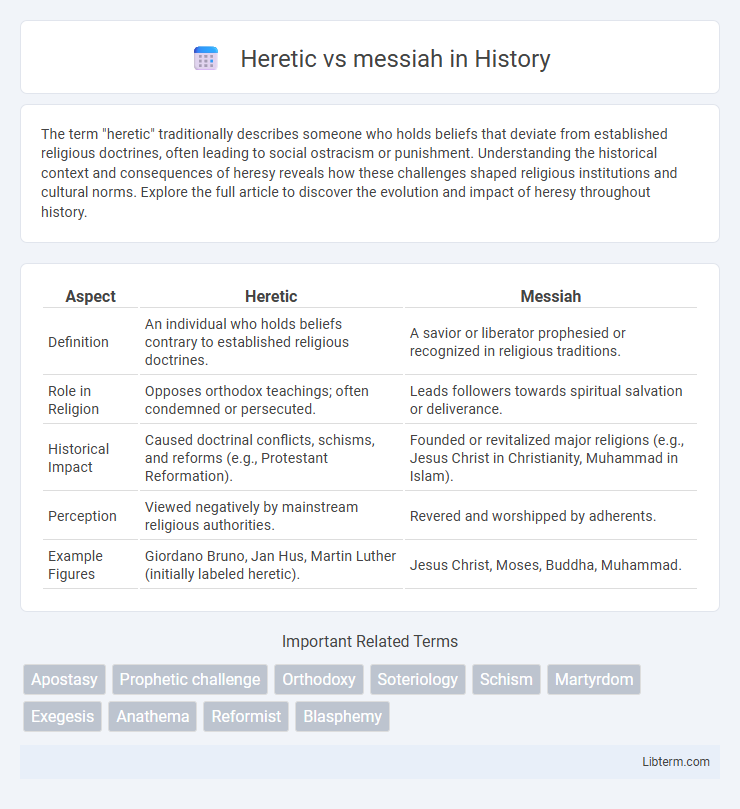The term "heretic" traditionally describes someone who holds beliefs that deviate from established religious doctrines, often leading to social ostracism or punishment. Understanding the historical context and consequences of heresy reveals how these challenges shaped religious institutions and cultural norms. Explore the full article to discover the evolution and impact of heresy throughout history.
Table of Comparison
| Aspect | Heretic | Messiah |
|---|---|---|
| Definition | An individual who holds beliefs contrary to established religious doctrines. | A savior or liberator prophesied or recognized in religious traditions. |
| Role in Religion | Opposes orthodox teachings; often condemned or persecuted. | Leads followers towards spiritual salvation or deliverance. |
| Historical Impact | Caused doctrinal conflicts, schisms, and reforms (e.g., Protestant Reformation). | Founded or revitalized major religions (e.g., Jesus Christ in Christianity, Muhammad in Islam). |
| Perception | Viewed negatively by mainstream religious authorities. | Revered and worshipped by adherents. |
| Example Figures | Giordano Bruno, Jan Hus, Martin Luther (initially labeled heretic). | Jesus Christ, Moses, Buddha, Muhammad. |
Understanding the Terms: Heretic and Messiah
A heretic is an individual who holds beliefs or opinions that deviate from established religious doctrines, often facing condemnation or persecution by orthodox communities. In contrast, a messiah is regarded as a divinely anointed savior or liberator, expected to bring salvation and restore righteousness according to specific religious traditions. Understanding these terms requires recognizing the opposing roles they play within theological discourse: one as a challenger to orthodox faith, the other as a prophesied redeemer.
Historical Contexts of Heresy and Messiahship
The historical context of heresy is deeply rooted in early religious debates where divergent beliefs challenged established orthodox doctrines, often leading to social and political exclusion. Messiahship historically emerged within Jewish traditions as a prophesied deliverer or savior expected to restore Israel and bring divine justice, later evolving in Christian theology to denote Jesus Christ's role as the anointed one. The tension between heresy and messiahship highlights the struggle over religious authority and legitimacy, with heresies often representing alternative interpretations or rejections of messianic claims.
Heretic vs Messiah: Defining the Controversy
Heretic vs Messiah centers on the conflict between a figure labeled as a heretic for challenging established religious doctrines and a messiah revered as a divine savior embodying faith and salvation. The controversy often arises from differing interpretations of spiritual authority, legitimacy, and the perceived threat to established religious institutions. This clash encapsulates deep theological debates and power struggles that shape religious history and belief systems worldwide.
Origins and Evolution in Religious Thought
The concept of a heretic originates from early Christian communities where divergent beliefs were deemed threats to orthodoxy, leading to persecution and excommunication. The messiah, rooted in Jewish tradition, evolved through religious texts as a prophesied deliverer who would restore spiritual and social order. Over centuries, religious thought has continually redefined heresy and messianic roles, reflecting shifts in theological interpretation and institutional authority.
Social Impact: Outcasts and Saviors
Heretics often become social outcasts by challenging prevailing norms and inciting controversy, leading to alienation or persecution within their communities. Messiahs, on the other hand, are revered as saviors who inspire collective hope and drive social cohesion through transformative visions or actions. The contrasting societal roles of heretics and messiahs highlight the dynamics of marginalization versus acceptance in shaping cultural and spiritual movements.
Persecution and Acceptance Across Eras
The heretic often faced persecution marked by trials, excommunication, and social ostracism throughout history, embodying resistance against prevailing religious orthodoxy. In contrast, the messiah typically garnered acceptance, reverence, and eventual worship, symbolizing salvation and fulfilling prophetic expectations within their communities. These divergent trajectories illustrate shifting societal responses to figures challenging or embodying dominant spiritual narratives across cultures and eras.
The Role of Authority: Who Decides?
The role of authority in distinguishing heretic from messiah often hinges on established religious institutions and their doctrinal control. Historical and contemporary religious hierarchies wield power to define orthodoxy, labeling dissenting figures as heretics to maintain doctrinal purity. However, popular belief and cultural acceptance can challenge or overturn institutional judgments, reshaping the status of individuals from heretic to messiah.
Heretics Who Became Messiahs
Heretics who became messiahs often challenged established religious doctrines, sparking innovative spiritual movements that redefined faith communities. Figures like Jesus of Nazareth and Mani initially faced accusations of heresy but later emerged as central messianic leaders, profoundly influencing religious history and belief systems. Their teachings introduced transformative doctrines, blending or departing from orthodox traditions to inspire lasting followings.
Cultural Legacy and Modern Interpretations
Heretic and Messiah represent contrasting cultural legacies that shape religious and societal narratives across history. The term "Heretic" often connotes dissent from orthodox beliefs, leading to persecution but also inspiring reform movements and critical dialogue within faith traditions. Modern interpretations increasingly view heretics as catalysts for intellectual freedom, while Messiahs symbolize hope and salvation, their stories adapted to reflect contemporary values and social justice themes.
Heretic vs Messiah: Perspectives for Today
Heretic vs Messiah debates offer profound perspectives for today by challenging traditional authority and inspiring transformative social change. The heretic, often seen as a figure of dissent, questions established doctrines, fostering critical thinking and cultural evolution. In contrast, the messiah symbolizes hope and renewal, embodying the promise of spiritual or societal salvation that continues to influence modern ideological and religious movements.
Heretic Infographic

 libterm.com
libterm.com